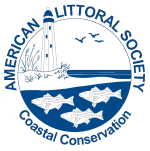|
The American Littoral Society applauds the submission of the Regional Mid-Atlantic Ocean Action Plan to the National Ocean Council for final review and adoption. This action is the final step before the Action Plan will be considered final and ready for implementation by over 18 federal, state and tribal entities. Submission of the final Mid-Atlantic Ocean Action Plan (Action Plan) concludes a four-month outreach process that included public review and comment of the draft Action Plan through written comments, public meetings and listening sessions around the region. The final version of the Action Plan submitted to the National Ocean Council incorporates feedback from the public during this summer’s outreach. "The Mid-Atlantic ocean faces increasing demands on its resources, space and ecology," said Tim Dillingham, Executive Director for the American Littoral Society. "We need a strategy that will protect marine life, as well as the traditional uses and clean water economies on which our coastal communities depend. This Ocean Action Plan can be a tool to reach those goals, and we will be reviewing how the agencies incorporated our feedback into the Ocean Action Plan.” "Today's submission of the Ocean Action Plan brings our region one step away from having our first ever regional plan to help ensure healthy ocean ecosystems and sustainable use,” said Sarah Winter Whelan, Ocean Policy Program Director for the Littoral Society. "The importance of that should not be undersold, but there is still a lot of work to be done. Implementation will bring another set of opportunities and challenges for us to ensure conservation prevails in this Plan."
The National Ocean Council must review the Action Plan for at least thirty days, with adoption possibly by the end of the year. In the following days, the public should receive word on the next steps for public engagement, including a webinar detailing the changes made between the draft and final Action Plan and the next steps for implementation. For more information about the webinar as it becomes available, go to MidAtlanticOceanPlanning.org. “Our goal throughout this effort has been to ensure that the Plan is a blueprint for conservation and management that reflects the public's goals for ocean protection," said Helen Henderson, Ocean Planning Manager for the Littoral Society. “We will continue towards this goal into implementation.” The effort to create a National Ocean Policy began in 2009 with an exhaustive outreach effort to coastal communities, citizens, ocean users and managers that lead to a Presidential Executive Order in 2010. Ocean Planning is a key part of the National Ocean Policy, as it encourages coastal regions to develop a plan for managing their ocean or Great Lake by coordinating the work of more than two dozen agencies while reconciling competing interests in the areas of fishing, offshore energy exploration and recreational activities. Development of specific plans is being done on a regional basis. The Northeast Region recently submitted the nation's first draft regional ocean plan to the National Ocean Council. The Mid-Atlantic Ocean Action Plan aims to be a road map for how federal and state agencies, tribes and the Mid-Atlantic Fishery Management Council can better collaborate to ensure healthy, productive, and resilient marine ecosystems and sustainable ocean uses in the state and federal waters off Virginia, Maryland, Delaware, Pennsylvania, New Jersey and New York. The ocean and coastal waters of the Mid-Atlantic region are environmentally and economically crucial. Over 34 million people call the Mid-Atlantic coastal region their home. The Mid-Atlantic ocean and coast serve as an economic engine, generating $2 trillion or 14 percent of U.S. annual gross domestic product. The ocean and coast are the hub for commercial and recreational fishing, shipping transportation to and from multiple ports, renewable energy production, high-speed telecommunications, science and research, tourism, and countless recreational interests and industries. Demands to increase existing uses and open the area to new development drive home the need for a plan that will help protect the environment and ecosystems that draw residents, tourists and industries. The area is already struggling with issues related to multiple forms of water pollution that are harming the environment and limiting the quality of life in our coastal communities. Likewise, increased activity and disturbances in offshore areas threaten sensitive and unique habitats and ocean features. Protecting such sensitive areas and preventing fossil fuel development are the Littoral Society's top priorities for the Mid-Atlantic Ocean Plan. "There are ecologically rich places in the Mid-Atlantic which have to be protected from new, and potentially harmful uses," Dillingham said. "We will be looking to make sure the plan gives strong protection to these areas, while maintaining environmental values such as clean water and protecting our coastal tourism economy.” "We will oppose efforts to reopen the Mid-Atlantic to oil and gas drilling, or other destructive industries," he added. "Finally, we will be watching closely to make sure the right tools are in place to ensure governmental agencies implement these policies, and include the public in ocean decision-making." Comments are closed.
|
Archives
November 2017
Categories
All
|
|
MidAtlanticOceanPlanning.org
is a project website for the American Littoral Society. The American Littoral Society promotes the study and conservation of marine life and habitat, protects the coast from harm, and empowers others to do the same. |
18 Hartshorne Drive Highlands, NJ 07732
732-291-0055 |

 RSS Feed
RSS Feed
